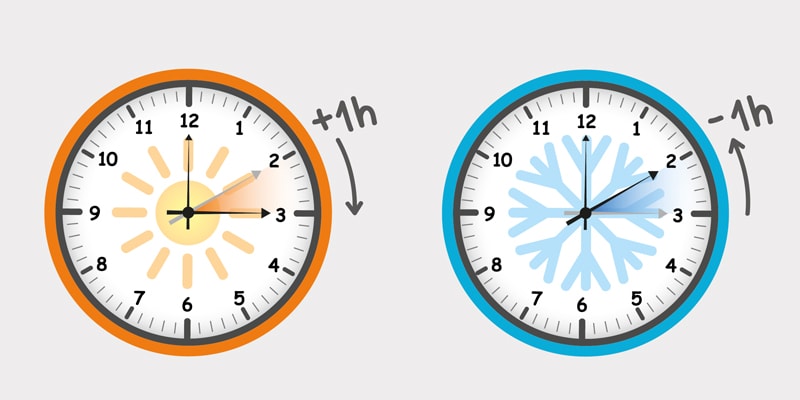Everything you need to know about the time change in Switzerland

Do I have to set my watch forward or set it back? When exactly does the time change happen, and why do we do it every year? Do you actually know what exactly the time change is about? We work with watches and their functions on a daily basis, so we thought we'd take a look at the question "Why do we change the time?". The most important aspects of the time change and the origins of this summer-winter transition are explained in this article.
When is the right time to go forward or backward?
Watches always change on the last Sunday in March and the last Sunday in October. In March, the watches are set forward, which means we lose an hour, while in October, the watches are set back, which means we lose an hour.

| Summer time changeover | Winter time changeover |
|---|---|
| 30.03.2025 | 26.10.2025 |
| 28.03.2026 | 24.10.2026 |
| 27.03.2027 | 30.10.2027 |
| 26.03.2028 | 29.10.2028 |
How did the time change come about?
In Europe, there have been three attempts to introduce time changes in order to save resources. Between 1976 and 1980, summer time as we know it today was introduced in many European countries, and Switzerland also adopted this time change shortly afterwards. The beginnings of time change in Europe can be traced back to the First World War. In 1916, it was necessary to save energy in the face of coal and oil shortages during the war. Summer time was therefore introduced to take advantage of the longer hours of sunshine in the evening and consume less oil and coal for lamps and heaters.
Shortly afterwards, however, this attempt was abandoned. Nevertheless, during the Second World War, daylight saving time was reintroduced by many European nations. Once again, the idea was to save energy. Between 1941 and 1942, Switzerland changed the time on its watches for the first time. Two years later, the action was interrupted again, as the energy savings were too low. By the end of the Second World War, most countries had also abolished summer time. But this was not the last attempt.
Between 1976 and 1980, many European countries brought back summer time. Once again, the idea was to take advantage of the extra hours of sunny evenings and that the population would consume less light, and therefore less electricity. The Swiss initially opposed this new introduction of summer time in a referendum. In 1981, the Federal Council finally won the referendum and introduced summer time in Switzerland. The main argument was that a single time would facilitate the operation of the European internal market.
When will the time change be abolished?
Discussions on abolishing the time switch are underway in neighbouring countries. Many European countries have already agreed on the need to abolish the switch from winter to summer time. However, they have not yet reached a decision on whether summer or winter time is preferable. The European Parliament and the European Commission have already come out in favour of abolishing the time change. But it will be some time before all the countries agree and a final decision is taken. If the EU abolishes the time change, Switzerland will also examine this adaptation. It is likely that the EU's decision will be followed in order to avoid, as in 1981, Switzerland becoming a time island, so that the European internal market can continue to function without problems.







